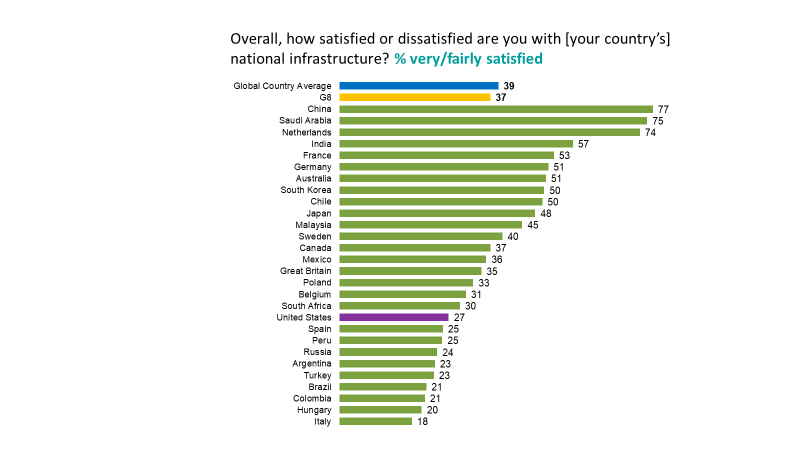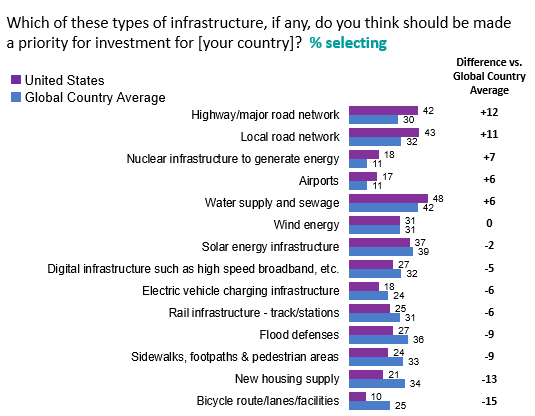2021 Global Infrastructure Index finds Americans particularly frustrated and focused on the economic impact of improvements
Water supply, road infrastructure, and solar energy are most viewed as priority areas for infrastructure investment in the U.S.
New York, NY, October 18, 2021 — A new 28-country Ipsos survey conducted in collaboration with the Global Infrastructure Investor Association finds Americans are among those least satisfied with their country’s infrastructure. Americans are also more likely than citizens from most other countries to prioritize economic infrastructure (e.g. transportation networks, utilities, and communications) over social infrastructure projects (e.g., school and hospital buildings and housing). Among 14 areas, those most widely perceived in the U.S. to be infrastructure investment priorities are water supply and sewage, local roads, highways, and solar energy.
The survey finds only 27% of U.S. adults saying they are satisfied with their country’s infrastructure, compared with an average of 39% across the 28 countries surveyed and 37% across all G8 countries.

Satisfaction with U.S. infrastructure is now at its lowest in the past five years. Three in five Americans (61%) agree that “as a country, we are not doing enough to meet our infrastructure needs.”
In the lead-up to COP26, the 2021 UN Climate Change Conference, the survey finds an average of 51% across the 28 countries feeling that, when making decisions on how to improve infrastructure, considerations about their impact on the environment should be given a higher priority than considerations about their impact on the economy, nearly double the 26% who put greater weight on their economic impact. However, the U.S. is split almost evenly with 37% prioritizing the environment vs. 34% prioritizing the economy.
Globally, the environment leads seven factors in terms of their importance when planning infrastructure for the future: on average across all 28 countries, 26% rank the environment as the single most important factor, slightly ahead of the quality of infrastructure, chosen by 23%. In the U.S., quality comes first (chosen by 30%), followed by the environment (23%). Ownership, i.e., whether the infrastructure is owned by the public sector or private businesses, is the factor most commonly ranked last, both globally (24%) and in the U.S. (28%).
As in previous years, there is a clear preference for maintaining and repairing existing infrastructure (chosen by 55% globally and 56% in the U.S.) rather than spending on new infrastructure projects (20% globally and 15% in the U.S.).
Majorities of citizens surveyed in all 28 countries agree that investing in infrastructure will create new jobs and boost the economy: 75% on average globally and 70% both on average across G8 countries and in the U.S.
Americans are especially prone to viewing infrastructure improvement through an economic lens when it comes to which types should be prioritized. Globally, social infrastructure edges economic infrastructure 42% to 35% when people are asked which should be a priority over the other. However, it’s the opposite in the U.S. where 47% say economic infrastructure should come first vs. 27% who say social infrastructure should be the priority. In the past year, sentiment has shifted toward investment in economic infrastructure both in the U.S. (up 7 percentage points since 2020) and globally (up an average of 3 points).
Americans’ preference for economic infrastructure is reflected in their views about where investment should be prioritized. Among 14 areas, the top five choices in the U.S. are:
- Water supply and sewage (selected by 48%),
- Local road network (43%),
- Highway/major road network (42%),
- Solar energy infrastructure (37%), and
- Wind energy (31%).
Utilities (water, electricity), road network, and airports are more likely to be selected as priorities in the U.S. than they are on average both globally (i.e., in the 28 countries surveyed) and all G8 countries:
- Highway/major road network by 12 points over the global country average and 14 points over the G8 country average;
- Local road network by 11 points and 6 points, respectively;
- Nuclear infrastructure to generate energy by 7 points and 6 points, respectively;
- Airports by 6 points and 8 points, respectively; and
- Water supply and sewage by 6 points and 15 points, respectively.
On the other hand, Americans are especially less likely than others to prioritize:
- Bicycle routes/lanes and facilities (by 15 points less than the global country average and 13 points less than the G8 country average);
- New housing supply (by 13 and 5 points, respectively);
- Flood defenses (by 9 points less than both); and
- Sidewalks, pathways, and pedestrian areas (by 9 points and 7 points, respectively).

About the Study
The survey was conducted by Ipsos on its Global Advisor online platform, July 23 – August 6, 2021, among 19,514 adults, 18-74 years of age in Canada, Malaysia, South Africa, Turkey, and the United States, and 16-74 in all other countries.
The samples in Brazil, China, Chile, Colombia, India, Malaysia, Mexico, Peru, Russia, Saudi Arabia, South Africa, and Turkey are more urban, more educated, and/or more affluent than the general population. Results should be viewed as reflecting the views of the more “connected” segment of their population.
The study was conducted in 28 countries, those starred countries have a sample size of 1,000+: Argentina, Australia*, Belgium, Brazil*, Canada*, Chile, China*, Colombia, France*, Germany*, Great Britain*, Hungary, India, Italy*, Japan*, Malaysia, Mexico, Netherlands, Peru, Poland, Russia, Saudi Arabia, South Africa, South Korea, Spain*, Sweden, Turkey and the United States of America*.
The Global Country Average reflects the average result for all the countries where the survey was conducted. It has not been adjusted to the population size of each country and is not intended to suggest a total result.
Where results do not sum to 100 or the ‘difference’ appears to be +/-1 more/less than the actual, this may be due to rounding, multiple responses, or the exclusion of “don't know” or not stated responses.
The precision of Ipsos online polls is calculated using a credibility interval with a poll of N=1,000 accurate to +/-3.5 percentage points. For more information on Ipsos’ use of credibility intervals, please visit the Ipsos website.
The publication of these findings abides by local rules and regulations.
For more information on this news release, please contact:
Nicolas Boyon
Senior Vice President, Public Affairs, U.S.
[email protected]
Kate Silverstein
Media Relations Specialist, Public Affairs, U.S.
[email protected]
About Ipsos
Ipsos is the world's third-largest Insights and Analytics company, present in 90 markets and employing more than 18,000 people.
Our passionately curious research professionals, analysts, and scientists have built unique multi-specialist capabilities that provide true understanding and powerful insights into the actions, opinions, and motivations of citizens, consumers, patients, customers, or employees. We serve more than 5000 clients across the world with 75 business solutions.
Founded in France in 1975, Ipsos is listed on the Euronext Paris since July 1st, 1999. The company is part of the SBF 120 and the Mid-60 index and is eligible for the Deferred Settlement Service (SRD).
ISIN code FR0000073298, Reuters ISOS.PA, Bloomberg IPS:FP www.ipsos.com
![[WEBINAR] Gen AI: From Wow to How](/sites/default/files/styles/related_more_insights/public/ct/event/2024-04/2.png?itok=xTndrk3o)

![[WEBINAR] What the Future: Risk](/sites/default/files/styles/related_more_insights/public/ct/event/2024-04/feature_3.png?itok=7g3Gd2gy)